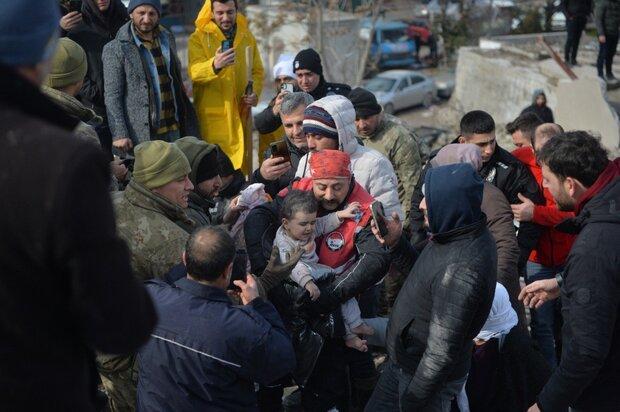Sanctions barrier for sending aid to quake-hit Syria
Syria cannot receive direct aid from many countries because of sanctions against President Bashar al-Assad’s government, the New York Times reported implying that sanctions are considered barriers to receiving aid while numerous people are trying to survive the catastrophe.
The head of the Syrian Arab Red Crescent, Khaled Hboubati, demanded on Tuesday, February 7, that Western countries, specifically the US and its allies, lift their siege and sanctions on Syria so that rescue and relief work can proceed unimpeded after the country was devastated by a powerful earthquake on Monday, ‘peoplesdispatch’ website reported.
“We need heavy equipment, ambulances, and fire fighting vehicles to continue to rescue and remove the rubble, and this entails lifting sanctions on Syria as soon as possible,” Hboubati said at a press conference on Tuesday, as reported by the Syrian Arab News Agency (SANA).
“What exacerbated the tragedy and catastrophe was the sanctions imposed by the United States and Western countries on Syria,” Foreign Minister Faisal Mekdad said in an interview with Lebanon's al-Mayadeen television network.
“When the Americans claim that they did not impose sanctions on humanitarian aid, we tell them that your sanctions prevent everything from Syria, including the purchase of medicines, just as Washington and its Western allies give orders to some countries, and threaten them with sanctions if they deal with Syria or any Syrian banks,” Mekdad said.
Monday’s devastating earthquakes killed hundreds of Syrians and shattered critical infrastructure already battered by the West’s decade-long dirty war against the Middle Eastern nation. But Washington has refused to budge on its sanctions, which aptly bear the name of an ancient Roman emperor known for his cruelty, Sputnik reported.
The United States will not be lifting its Caesar Act sanctions or other restrictions against Syria following Monday’s quakes, State Department spokesman Ned Price has indicated.
Khaled Hboubati, head of the Syrian Arab Red Crescent (SARC) has urged donor countries to cooperate to lift the blockade, while calling on the West, particularly the EU, to end its sanctions on the country.
The government of Bashar Assad in Damascus is still a pariah in much of the international community, sanctioned by the U.S. and European countries, which are reluctant to route aid directly through the government. American and EU officials have made clear the quake won’t change that, AP reported.
Emergency workers say delays could cost lives, as local rescue crews struggle to pull families and children from the rubble and find housing for survivors amid brutal winter weather, the source added.
On Monday, the American-Arab Anti-Discrimination Committee (ADC), a US-based advocacy group, called for the “immediate” lifting of US sanctions to facilitate the delivery of aid to Syria, according to Aljazeera.
“We commend and are thankful to existing organizations on the ground providing immediate humanitarian aid and relief to those in Syria, Turkey, and across the region. The reality is more aid and relief is needed, and time is of the essence,” ADC executive director Abed Ayoub said in a statement.
“Lifting of the sanctions will open the doors for additional and supplemental aid that will provide immediate relief to those in need.”
On February 7, the first consignment of Iran’s humanitarian assistance was dispatched to the quake-ravaged regions of Turkey. The batch included eight tons of hospital equipment, emergency treatment, and camping equipment.
The head of the Iranian Red Crescent Society (IRCS) Pir-Hossein Kolivand said on February 7 that the rapid relief team of the entity is slated to be sent to the quake-affected regions in the neighboring country.
The aid includes 10 teams comprising eight members each, he said, adding that the volunteer members are to render relief and medical services to the residents.
The teams are equipped with search and rescue pieces of equipment as well as necessary requirements, he noted.
On 6 February, south-eastern Turkey and northern Syria were rocked by a massive earthquake measuring 7.8 on the Richter scale, several powerful aftershocks, and then another earthquake causing unimaginable devastation. The earthquake toppled thousands of buildings and left more than 8,700 dead in both countries. The death toll is expected to climb as more bodies are recovered from the rubble.
Reported by Amin Mohammadzadegan Khoyi
News source: Mehr News ![]()
Related news: Sanctions barrier for sending aid to quake-hit Syria
Copyright © 2001-2024 - Sarkhat.com - About Sarkhat - News Archive - جدول لیگ برتر ایران

